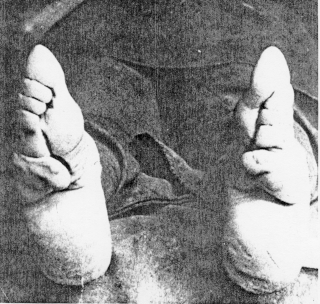The practice of "Feet Binding" was absolutely necessary for women in the Chinese culture, which deformed their feet and rendered them completely handicapped. This was done because Chinese men were attracted by 'tiny' feet. (Meaning only a few inches long). It was also done because men wanted complete control over their wives.
Divorce for Chinese women was NEVER an option.
So against the advice of her parents, Ms. Cai, 29, decided in June to leave her husband. Five years of marriage dissolved after 30 minutes of paperwork. She celebrated at a teahouse with friends. By August, Ms. Cai was advising a friend who had also decided to end her marriage with an unfaithful spouse.
"Several of my friends have gotten divorced," Ms. Cai said this week during a break at her office, explaining how things are changing here. "My friends think divorce is normal, not an unthinkable thing."
Divorce was once a dreaded fate for women in China. Now, many younger urban women like Ms. Cai view it almost as a civil right, which has helped drive up divorce rates. One government study found that women had initiated 70 percent of divorce applications here in Guangdong Province, where the number of divorces increased by 52 percent last year.
For women, and for men as well, changing social mores have brought changing expectations of marriage. If Chinese couples once recited ancient vows "to remain loyal to each other even if the seas run dry and the rocks crumble," as scholars point out, these days bad food or bad sex is enough to end some marriages.
"In the past, traditional values were the most important thing," said Yuan Rongqin, a psychotherapist in Guangzhou who treats a growing number of people for marriage- and divorce-related problems. "Now, individualism has taken over."
Divorce, then, has become yet another barometer of how Western influences introduced by two decades of economic change have rippled through Chinese society. China now has divorce lawyers, divorce counselors, prenuptial agreements and private detective agencies that photograph cheating spouses in the act. Several television shows about divorce have become popular.
"People's idea about the concept of marriage is changing," said Lu Ying, a lawyer who runs the Women and Gender Study Center at Zhongshan University in Guangzhou. "Instead of thinking of having just one spouse for a lifetime, now they are thinking about the quality of a marriage. If it doesn't work out, then they are quietly ending it."
Infidelity has emerged as a leading cause of divorce. A survey in Guangdong, cited by state media, found that work pressure contributed to 60 percent of divorces while adultery contributed to 30 percent. Unhappiness with a "poor sex life" played a role in 20 percent of divorces.
Mr. Yuan stated 80 percent of the patients who came to him for marital counseling complain of adultery. "There are more choices now in sex," Mr. Yuan said. "The change in traditional family values has led to more affairs."
Ms. Cai, the woman divorced in June, discovered a photograph of her husband and his lover. Infuriated, she told him that he must stop seeing his mistress, but he refused. Ms. Cai's parents fretted about the shame associated with divorce.



By the time a girl turned three years old, all her toes but the first were broken, and her feet were bound tightly with cloth strips to keep her feet from growing larger than 10 cm., about 3.9 inches. The practice would cause the soles of feet to bend in extreme concavity.
Foot binding ceased in the 20th century with the end of imperial dynasties and increasing influence of western fashion, according to the UCSF study. "As the practice waned, some girls' feet were released after initial binding, leaving less severe deformities," Cummings says. "However, the deformities of foot binding linger on as a common cause of disability in elderly Chinese women."

The 'ideal' length of a perfect foot, called the "Golden Lotus", was three inches long. This was a rare occurrence, this 3 inch perfection, but it was something to strive for nonetheless. Perfect feet were seen as a type of dowry to sweeten the pot when trying to marry off your daughter to someone with Standing.
If your feet ended up over four inches long you could pretty much forget them bringing you any extra leverage when marriage offers came around - they were considered too large, and ruined; all the work done to mutilate them had been a "waste" of time.


No comments:
Post a Comment